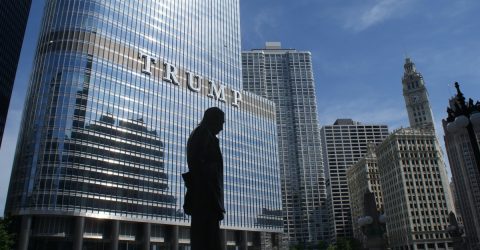What is QAnon and why is social media so worried about it?
The online conspiracy theory retweeted by Trump has platforms cracking down, but why?

Q, who?
Over the Summer you might have heard about QAnon. Reddit, TikTok and other platforms have been cracking down on it by removing ‘#QAnon’ content. Even Instagram influencers and celebrities are talking about it! So it seems 2020 is the year it has ‘gone mainstream’, but what is it?
Well, it’s more than a little complicated. You may have heard it in relation to Donald Trump and something called the ‘deep state’. Lost? We’ll try and do our best to explain.
So what is it?
QAnon is an online conspiracy theory. The story is complex and often times makes little sense, but try and stay with us.
QAnon followers believe that an anonymous online forum poster called ‘Q’ is a ‘high clearance’ member of US intelligence. There are many theories as to who he is, from Donald Trump to the deceased John F Kennedy Jr.
Ok…go on.
Q has been posting crypric clues and messages online since 2017; these posts are called ‘Q drops’ or ‘breadcrumbs’. This is why QAnon followers often refer to themselves as bakers – they ‘bake’ the crumbs’. In other words this means they try to decode or find meaning in these Q posts.
Q’s posts are often vague and can be interpreted in many ways. Followers treat them as a prediction and often try and fit the posts to current events.
Despite their vagueness, Q posts tend to follow a narrative. Q says that Donald Trump has been chosen to fight ‘the deep state’. Q explains away Trump’s gaffes and failures by saying he is playing a long game, or ‘4D chess’.
The deep state is an independent conspiracy theory that has been around for a while. It speculates that governments have been infiltrated by a shadowy cabal of puppet masters working behind the scenes. The deep state is considered the ultimate bad guy.
QAnon states that the deep state is made up of a group of Satan-worshipping paedophiles. Q says this group is led by celebrities and well known politicians, often those who oppose Trump publicly. Posts often make claims of child trafficking rings and arrests of those involved.
Q also says that there is a planned coup to unseat Donald Trump, led by Hilary Clinton and Barack Obama. One repeated claim is that those mentioned are due to be arrested, or have already been arrested. Q says the reason this isn’t reported is because it would scare the public too much.
That’s the general gist of it, but there are often much more outlandish claims!
Who actually believes this?!
QAnon initially had an exclusively far right, often Trump-supporter base. However shockingly the ‘belief system’ is now spreading to gullible people from across the political spectrum on social media.
Recently there has been a spate of ‘mommy blogger’ or instagram influencers who have joined the ‘bakers’. However it’s possible these influencers are trying to gain followers by piggybacking onto the hashtags, rather than believing in paedophile cults!
Why do social media platforms care?
Over the years Q has gone from being a fairly harmless conspiracy theory to laying the ground for terrorist activity. The FBI are increasingly concerned over the number of incidents involving Q followers.
Platforms are growing concerned over the increasing posts related to QAnon that are inciting violence. QAnon supporters use hashtags to co-ordinate online abuse against ‘enemies’.
These enemies are the politicians, celebrities and journalists who they believe are covering up for the ‘cabal’. Recently celebrity Chrissy Teigen was targeted by QAnon followers.
Teigen is outspoken in opposition to Trump, even getting in Twitter fights with him. Q followers harassed her with claims she is a member of the cabal and abuses her own children.
However the concern isn’t just just over threatening messages and harassment. Twitter says that it took action against QAnon because of the potential for inciting “offline harm”.
Since 2017 there have been arrests of QAnon believers for making threats or taking offline action.
In 2018 a man was jailed for blockading a bridge with a cache of guns. His intentions were unclear but he says he was motivated by ‘patriotism’ and sends letters from prison with QAnon slogans.






